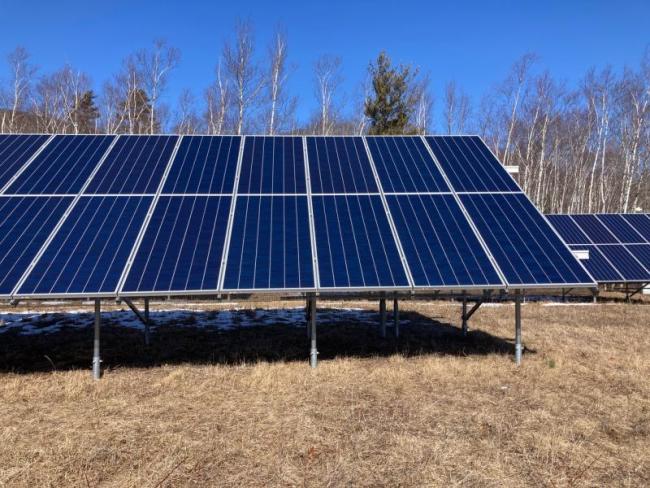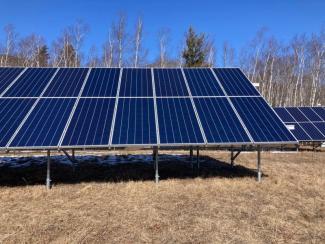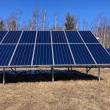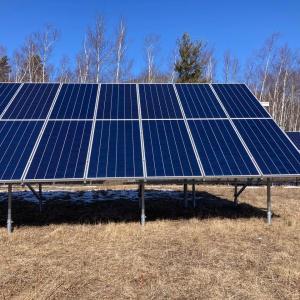Camden’s Climate Reawakening
I was poking around in old computer files the other day when I came across an article I wrote for this very blog four years ago, virtually to the day – in the second spring of the Covid pandemic. The article started with a rundown of the ways in which Camden had been a “pacesetter in what many see as the biggest challenge of our age: eliminating greenhouse gas emissions and adapting to the climate changes that are coming nonetheless.”
The town had installed a solar array and LED streetlights and become the first Maine municipality to sign the Global Covenant of Mayors. More was planned. Then “like air rushing out of a balloon,” Camden abruptly lost its appetite for climate action, and much else. That spring of 2021, the town Energy and Sustainability Committee – of which I was a member – was disbanded along with all Camden’s other non-statutory committees.
The article went on to express befuddlement as to why Camden had apparently lost interest in bigger solar projects to cover the town’s entire electricity needs – unusually hefty due to the Snow Bowl -- dropped efforts to fund energy-efficiency improvements for low-income households, and even refused to join the library in sponsoring a series of “Let’s Talk Energy” programs put together by Energy Committee member and famed food writer Nancy Harmon Jenkins.
It’s striking to read this article, realizing how long Camden’s “hiatus” – then the favored word for the status of the town committees -- would last on action to limit and adapt to climate change.
Thankfully, the town is now reawakening to the “biggest challenge of our age,” prodded by the devastating storms that struck our beautiful harbor in the winter of 2023-24 and also by CamdenCAN (Climate Action Now) and other independent citizens’ group that sprung up to foster care for various aspects of our endangered ecosystem.
Camden Could, and CAN Again
Barely two years old, CamdenCAN’s first priority was, and is, to foster conversation and action by the larger community in and around Camden on the ongoing climate crisis. It’s first big official task was to help the town government engage the community in an assessment of Camden’s Harbor Resiliency. That assessment is nearly complete, and includes ideas not only for making harbor properties more resilient to storms and rising sea levels, but also for enhancing the harbor’s role in all our lives.
Since then, CamdenCAN has sponsored public presentations on numerous topics; a “food garden” tour last summer that will be reworked and repeated this year; reading and discussion groups; potluck dinners; conversation circles; and more.
But as activists, we at CamdenCAN – I’m on the steering committee – quickly found ourselves drawn back to several of the projects the old Energy and Sustainability and town government had been engaged with. First is buying out the small solar array on town property at Sagamore Farm, which Camden had Revision Energy build, operate, and temporarily own. This will hopefully be a quick precursor to expanding solar capacity directly owned by the town from the get-go, now that the tax code encourages that.
Recently, CamdenCAN also worked with the Rockport Conservation Commission and the two town governments to obtain a Maine Community Action Grant that will see our neighboring communities relaunch efforts to help residents – especially low-income households-- learn how to make their homes more energy-efficient – and warmer with less fuel oil or propane – through volunteer energy coaching.
Paying the Bills
Back in 2021 the big issue was “a lack of time by town officials given the many other issues pressing for their attention,” as I wrote at the time. I recommended then, as the Watershed School’s amazing global climate change class had before me, that the town hire a “sustainability” or “climate action” officer, in line with several other Maine communities including Rockland.
But how to pay for such a staff addition? While massive economic stimulus spending had already been passed by the federal government in 2021, we weren’t yet used to the idea that federal grants would be widely available, so I suggested other revenue-raising alternatives.
Now, with some new hiring, town staff again seem energized to return to climate-related work. The limiting factor this time is the prospect that federal grants may dry up. Since last November’s national electons, the flow of federal funding that has been so ample since 2021 is shrinking back to a trickle. States and municipalities are being thrown back more onto their own devices to pay for everything from climate-related measures, to housing and infrastructure projects.
So the question again arises: How to pay for the vital projects Camden needs? Let’s allow first that not all grants have disappeared. The state still has funding, as the joint Camden-Rockport energy-coaching initiative demonstrates. So do many private foundations. Even the federal spigot isn’t turned off entirely.
Beyond that, assuming the Republican-controlled Congress will extend and expand federal tax cuts, perhaps some tax or other revenue-raising hikes at local level would be possible without increasing most people’s overall tax burden -- a little less to Washington, a little more to Camden and perhaps Maine. Many of us have already seen big property tax hikes lately, though, and Camden may need to consider other ways to raise revenue.
One obvious possibility is a small incremental sales tax – which would shift a bit of the burden to tourists, few of whom would ever notice. Another is a property-tax surcharge on homes that sit empty much of the time. I proposed something of that sort in 2021, arguing that an extra charge on owners who mainly live elsewhere and don’t pay state income taxes – or provide rental accommodation– would be fair and affordable. Non-winterized camps would be exempt from the surcharge.
My proposal aligned with a bill sponsored in Augusta that year by Rep. Christopher Kessler of South Portland. After real estate interests helped defeat his bill, Kessler was quoted as saying that he had realized it was a long shot but saw the proposal as raising “awareness about the innovative tactics governments can use” to fund needed activities. Indeed. Camden will need such innovation to keep momentum going for climate-related and other programs that justice – and prudence -- demand as Washington retreats.
About this blog:
Tales from the Transition

I’m Sarah Miller, a semi-retired international energy and business journalist and editor, and now a Camden resident. Having spent a career learning about old energy, I’ve turned to new energy in recent years. In doing so, I’ve come to see how important fossil fuels and the way they work were to the structure of 19th and 20th Century economies and societies. I’ve also started to imagine what cleaner, more distributed energy forms could mean for the structure of 21st Century economies and societies. The climate crisis is frightening, but the energy and social transitions that accompany it can bring us a better world -- if communities like ours here on the Midcoast work in a bottom-up, “distributed” way to make it so. That’s what Tales from the Transition is all about.
I am active in the community through the Camden Energy and Sustainability Committee, the Camden Philosophical Society, the board of Bay Chamber Concerts and Music School, and the climate activist group Climate Matters Maine. I am a former president of the Camden Conference. The views expressed in this blog, however, are strictly my own.


























